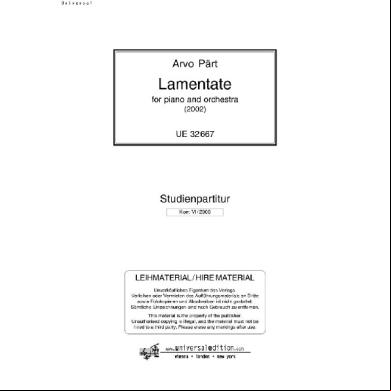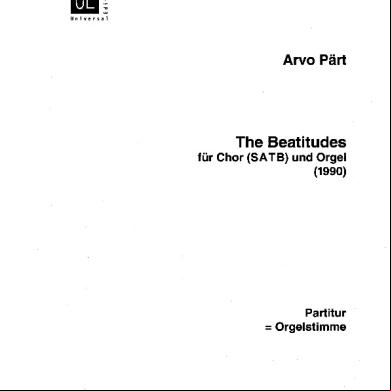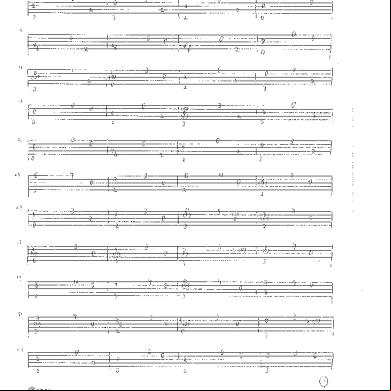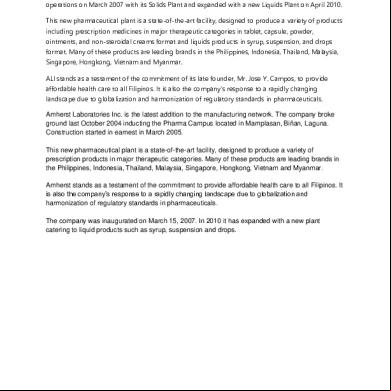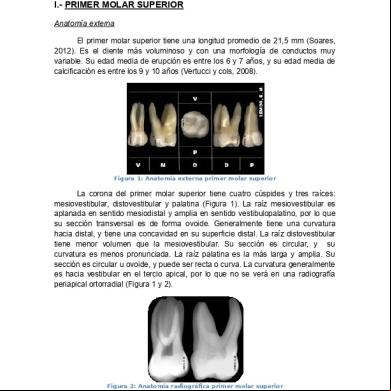Arvo Part 2l466g
This document was ed by and they confirmed that they have the permission to share it. If you are author or own the copyright of this book, please report to us by using this report form. Report 445h4w
Overview 1s532p
& View Arvo Part as PDF for free.
More details 6h715l
- Words: 449
- Pages: 2
ARVO PÄRT (1935) Estonian composer Identified with the school of minimalism (mystic or holy minimalism) He employs his self-invented technique, Tintinnabuli
Pärt has 2 periods in his compositions: Neo-classical – Avant-garde (1958-1968) style influenced of Shostakovich, Prokofiev and Bartok, using Shoenberg’s twelve-tone technique and serialism. The crisis (1968–1976) Pärt’s quest for his own musical voice drove him into a creative crisis that dragged on for eight years, in this period he studied Gregorian chant, the Notre Dame School and renaissance polyphony. This crisis gave birth to music in his 2nd period called Tintinnabuli.
TINTINNABULI Like the ringing of bells 1976 - Present The Tintinnabuli technique of composition is a process by which a form of polyphony is built out of tonal material drawn from beyond the paradigms of functional harmony. In vocal works, structure and form are additionally subject to all parameters of the text (syllables, words, accents, grammar, punctuation). First work in this style: Für Alina. Simple harmonies, rhythm and single unadorned notes of triads Do not change tempo Settings for sacred text: Latin or Church Slavonic Language used in Orthodox liturgy
The Arvo Pärt Centre Laulasmaa, Estonia 2010 - Present The Arvo Pärt Centre was founded in 2010 by Arvo Pärt and his family with the aim of creating opportunities for preserving and researching the creative heritage of the composer in his native land, Estonia, and in the context of the Estonian language. Research Institute Education and music centre Museum and publishing facility Archive of Pärt´s works
REFERENCES Empresa Mayo de 2010 - Presente
http://www.arvopart.ee/en/ http://www.arvopart.org/ http://www.universaledition.com/Arvo-Paert/composers-and-works/composer/534
http://www.npr.org/artists/16070552/arvo-part http://www.musicolog.com/part_lenten.asp#.Vwx4x_krLX7
IMPORTANT WORKS Solfeggio 1963/1964 Symphony no1 1963/1964 Symphony no2 1966 Symphony no3 1971/1972 Symphony no4 2008/2009 Credo 1968/1968
Für Alina 1976/1976 Arbos 1977 Fratres 1977 Tabula Rasa 1977/1977 Spiegel im Spiegel 1978/1978 Annum per Annum 1980/1980
Te Deum 1985/1985 Stabat Mater 1985/1985 Miserere 1989/1989 Lamentate 2003/2003 acaglia 2003/2003 L’abbé Agathon 2004/2004
Accomplishments 1996 – American Academy of Arts and Letters Department of Music 1996 – Honorary Doctor of Music, University of Sydney 1998 – Honorary Doctor of Arts, University of Tartu 2003 – Honorary Doctor of Music, University of Durham 2006 - Order of the National Coat of Arms 1st Class 2008 – Léonie Sonning Music Prize 2008 – Austrian Cross of Honour for Science and Art, First Class 2009 – Foreign Member, Serbian Academy of Sciences and Arts 2010 – Honorary Doctor of Music, University of St Andrews Empresa 2011 – Chevalier (Knight) of Légion d'honneur Mayo 2010 - Presente 2011de – hip of the Pontifical Council for Culture 2013 – Archon of the Ecumenical Patriarchate 2014 – Recipient of the Praemium Imperiale award, Japan 2014 – Honorary Doctor of Sacred Music, St. Vladimir's Orthodox Theological Seminary
Pärt has 2 periods in his compositions: Neo-classical – Avant-garde (1958-1968) style influenced of Shostakovich, Prokofiev and Bartok, using Shoenberg’s twelve-tone technique and serialism. The crisis (1968–1976) Pärt’s quest for his own musical voice drove him into a creative crisis that dragged on for eight years, in this period he studied Gregorian chant, the Notre Dame School and renaissance polyphony. This crisis gave birth to music in his 2nd period called Tintinnabuli.
TINTINNABULI Like the ringing of bells 1976 - Present The Tintinnabuli technique of composition is a process by which a form of polyphony is built out of tonal material drawn from beyond the paradigms of functional harmony. In vocal works, structure and form are additionally subject to all parameters of the text (syllables, words, accents, grammar, punctuation). First work in this style: Für Alina. Simple harmonies, rhythm and single unadorned notes of triads Do not change tempo Settings for sacred text: Latin or Church Slavonic Language used in Orthodox liturgy
The Arvo Pärt Centre Laulasmaa, Estonia 2010 - Present The Arvo Pärt Centre was founded in 2010 by Arvo Pärt and his family with the aim of creating opportunities for preserving and researching the creative heritage of the composer in his native land, Estonia, and in the context of the Estonian language. Research Institute Education and music centre Museum and publishing facility Archive of Pärt´s works
REFERENCES Empresa Mayo de 2010 - Presente
http://www.arvopart.ee/en/ http://www.arvopart.org/ http://www.universaledition.com/Arvo-Paert/composers-and-works/composer/534
http://www.npr.org/artists/16070552/arvo-part http://www.musicolog.com/part_lenten.asp#.Vwx4x_krLX7
IMPORTANT WORKS Solfeggio 1963/1964 Symphony no1 1963/1964 Symphony no2 1966 Symphony no3 1971/1972 Symphony no4 2008/2009 Credo 1968/1968
Für Alina 1976/1976 Arbos 1977 Fratres 1977 Tabula Rasa 1977/1977 Spiegel im Spiegel 1978/1978 Annum per Annum 1980/1980
Te Deum 1985/1985 Stabat Mater 1985/1985 Miserere 1989/1989 Lamentate 2003/2003 acaglia 2003/2003 L’abbé Agathon 2004/2004
Accomplishments 1996 – American Academy of Arts and Letters Department of Music 1996 – Honorary Doctor of Music, University of Sydney 1998 – Honorary Doctor of Arts, University of Tartu 2003 – Honorary Doctor of Music, University of Durham 2006 - Order of the National Coat of Arms 1st Class 2008 – Léonie Sonning Music Prize 2008 – Austrian Cross of Honour for Science and Art, First Class 2009 – Foreign Member, Serbian Academy of Sciences and Arts 2010 – Honorary Doctor of Music, University of St Andrews Empresa 2011 – Chevalier (Knight) of Légion d'honneur Mayo 2010 - Presente 2011de – hip of the Pontifical Council for Culture 2013 – Archon of the Ecumenical Patriarchate 2014 – Recipient of the Praemium Imperiale award, Japan 2014 – Honorary Doctor of Sacred Music, St. Vladimir's Orthodox Theological Seminary


